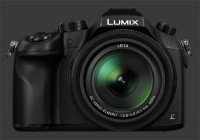Panasonic Lumix DMC-FZ1000 Review
Panasonic Lumix DMC-FZ1000 Performance - How well does it take pictures?
The Panasonic Lumix DMC-FZ1000 takes an entirely different approach than previous ultra-zooms. Instead of achieving a huge optical zoom by using a tiny sensor, this digital camera offers a relatively modest 16X optical zoom with a much larger 1" sensor. This provides a versatile 25-400mm with nice F/2.8-4 maximum aperture. The downside is obviously added bulk but this provides an unprecedented compromise.

At its native sensitivity of ISO 125, the Panasonic FZ1000 shows very little image-noise. The expanded Low ISO 80 and 100 are just as good. Noise-Reduction does kick in though based on the shutter-speed. Images unfortunately vary from sharp to quite soft. ISO 200 barely shows speckles of noise and remains just as usable.
ISO 400 and 800 show slightly more noise and also additional softness from noise-reduction. This negatively affects print sizes but, given a full-resolution of 20 megapixels, relatively large prints are still possible, particularly in bright light.
By ISO 1600, there is noticeably more luminance noise. ISO 3200 is just a little noisier too. Still, contrast and dynamic-range are reasonably maintained. Mid-size prints come out nicely without much cleanup. ISO 6400 shows a high amount of noise and details suffer significantly, leaving the mid-sized prints slightly noise yet usable.
ISO 12800 shows even more noise. It impressively manages to produce small usable prints, something which cannot be said about ISO 25600 which produces heavy color-noise and images without details. Overall, the performance of the 1" CMOS sensor is better than that of traditional 1/2.3" sensors used in ultra-zooms. Somehow though, it does not deliver an as solid performance as we have seen from other sensors of the same size.
Sharpness and Noise-Reduction settings fight which each other. To get good results without sharpening artifacts or too much softness, one should set Sharpness to +3 and Noise-Reduction to -3. The steps are fairly granular, so ±1 from those suggested settings produces good results as well.

Color rendition is much improved from previous Panasonic ultra-zooms. The default Standard style is too punchy while the Natural style is too dull. The best colors are obtained in Natural style with Saturation at +1. This makes color sufficiently close to reality. Natural style also needs +1 of Contrast to produce images with more impact without forcing them to appear unnatural.
Automatic white-balance is good. It copes well with different types lighting and produces balanced colors in a variety of conditions. The Custom White-Balance function is quite reliable. Artificial lights leave an occasional cast but rarely a strong one.
The Multi-Segment metering system used by this digital camera is about average. It prefers over-exposure over under-exposure and therefore clips bright highlights more often than it should. However, when dynamic-range is within the camera's ability, exposure is usually good.

The large lens on the Panasonic FZ1000 produces images of acceptable sharpness overall. There is a slight general softness at bright apertures which goes away mostly 2-3 stops down from the maximum, depending on the focal-length and focus-distance. The nice thing is that sharpness is mostly consistent across the frame.
Optical distortion is extremely low and so are chromatic aberrations. There is no sign of vignetting at all either. The FZ1000 probably corrects for such aberrations internally, so those shooting RAW may get such nice output directly.
The Panasonic Lumix DMC-FZ1000 is generally faster than most fixed-lens cameras. The autofocus normally takes ¼ - ½s to lock and rarely takes much longer. It slows down towards the telephoto end of the zoom which is quite normal.
In practice, focusing is almost always faster because of the Eye-Start AF and Quick AF options which lets this camera pre-focus when the Eye-Sensor is triggered or camera movements slows down, respectively. This shortens battery-life a little.
The following performance numbers characterize the performance of this camera:
- Startup: Just under 1½s. Excellent. If Lens Resume is enabled, it may take up to 4s though.
- Shutdown: Between 2 and 4 seconds, depending on the lens position. Below average.
- Zoom: 3s from wide-angle to telephoto. Average.
- Autofocus: ¼ - ½s usually. Very good.
- Shutter-Lag: Instant with very short blackout. Excellent.
- Shot-to-Shot: 2/3s. Slower in low-light due to noise-reduction. Average.
- Playback: Almost instant to enter, ¾s to exit. Below average.
The above numbers are good but not so consistent. At least AF and shutter-lag are fast. Shot-to-shot speeds could be better too for a high-end digital camera. The camera is highly responsive though.
This Panasonic uses a large proprietary Lithium-Ion battery which supplies 360 shots per charge according the CIPA standard. This is below average for an ultra-zoom. A second battery is therefore highly recommended for an entire day of photography.
Panasonic Lumix DMC-FZ1000 Conclusion

The Panasonic Lumix DMC-FZ1000 is a feature-rich ultra-zoom with the widest field-of-view and longest zoom of any fixed-lens camera. Its 60X optical zoom offers dependable image-stabilization and a previously unseen 20-1200mm equivalent range. This versatility is both highly practical and fun.
Inside the FZ1000 is a high-resolution 16 megapixels CMOS sensor which can shoot at full-resolution up to 9 FPS and capture full 1080p HD video at 30 FPS or 720p at 60 FPS. The video capability offers PASM manual-controls and a zooming stereo microphone with built-in wind-filter.
Image-quality of this ultra-zoom is good when there is enough light. In such conditions, autofocus is rather fast and locks even quicker with pre-focus enabled. Like all small sensor cameras, low-light makes this Panasonic struggle yet it manages to lock focus on very dim subjects long after most cameras would have given up.
This ultra-zoom has plenty of controls to make it efficient to operate. The actual menu system is rarely needed and the camera generally remains responsive. It rarely gets in the way and seems well thought-out for the most part. The EVF is tiny and low-resolution but, like the LCD, at least shows an accurate preview of exposure when the shutter is half-pressed.
The FZ1000 is a good candidate for photography during certain types of travel like tours where people often visit sites in bright daylight and the entire group is moving quickly from place to place. Having an all-in-one camera like this one for such occasions means that lots of photos can be taken with a variety of focal-lengths without slowing others down.
 |
Please Support Neocamera
All information on Neocamera is provided free of charge yet running this website is a huge endeavor. Purchases made via affiliate links found throughout the site help keep it running and up-to-date. There is no additional cost to you, so please consider buying via these links to our affilates:
If you found any information on this site valuable and did not purchase via our affiliate links, please considering donating via PayPal:
Any amount will be greatly appreaciated. Thank you for your support!
Panasonic DMC-FZ1000 Highlights

Sensor-Size: 13 x 9mm

Actual size when viewed at 100 DPI
| 20 Megapixels Ultra Zoom | ISO 80-25600 |
| 16X Ultra-Wide Optical Zoom | Shutter 1/16000-60s |
| Built-in Stabilization | Full manual controls, including Manual Focus |
| 0.39" Built-in EVF 2.4 Megapixels (0.70X) | Custom white-balance with 2 axis fine-tuning |
| Automatic Eye-Start sensor | Spot-Metering |
| 2 Axis Digital Level | Hot-Shoe |
| 12 FPS Drive, Unlimited Images | Stereo audio input |
| 3840x2160 @ 30 FPS Video Recording | Lithium-Ion Battery |
| 3" LCD 920K Pixels | Secure Digital Extended Capacity |
Updates
2024.11.18

Best 2024 Photography Gifts for Every Budget
Great gifts for photographers and photo enthusiasts selected for every budget among the best products of 2024.
2024.08.07

Eye Protection Tips for Professional Photographers
The four main considerations for professional photographers regarding eyewear.
2024.07.14

Fujifilm X100VI Review
Flagship fixed-lens compact digital camera with a 40 MP sensor and Image-Stabilization, a first for the series. Retro design featuring dual control-dials, plus direct ISO, Shutter-Speed and EC dials. Its hybrid viewfinder can switch between EVF and OVF mode.
2024.05.09

Fujifilm GFX100 II Review
Flagship 102 Megapixels Medium-Format Mirrorless Digital Camera with 8-Stop 5-Axis IBIS, 8 FPS Drive, 8K Video and 400 MP Super-Resolution capture in a weatherproof and freezeproof body with dual control-dials and dual memory-card slots.
2024.04.03

Fujifilm X-T5 Review
Newest Fujifilm flagship boasting a 40 MP APS-C sensor, 5-axis IBIS with 7-stop efficiency, 15 FPS continuous drive, 6.2K Video capture, dual control-dials and dual SDXC UHS-II slots in a sturdy weatherproof and freezeproof body.
2023.11.20

Best Digital Cameras of 2023
Find out which are the Best Digital Cameras of 2023. All the new Mirrorless Digital Cameras from entry-level to high-end professional.
2023.07.10

Fujifilm X-H2 Review
40 Megapixels APS-C Hybrid Mirrorless Digital Camera with 7-stop IBIS. Fastest shutter ever and 8K video capture. Large builtin EVF with 0.8X magnification and 5.8 MP, plus an Eye-Start Sensor. Packed with features and large number of controls in a weatherproof and freezeproof body.
2023.05.07

Sony FE 20-70mm F/4G Review
Review of the unique Sony FE 20-70mm F/4G lens. The optical zoom of this lens spans ultra-wide-angle and medium focal-length coverage, making it one of the most versatile Full-Frame lenses on the market.
2023.01.15

Huion Inspiroy Dial 2 Review
Review of the Huion Inspiroy Dial 2 tablet, a medium sized drawing surface with dual dials and customizable buttons. Connects via USB-C or Bluetooth 5.0 with Windows, Linux and Android support.
2022.12.08

How to Pack for a Photo Trip
Find out how to pack for a travel photography trip, carry your gear safely while meeting airline regulations.
2022.11.13

Best Digital Cameras of 2022
The best digital cameras of 2022. A short list of the most outstanding models in their respective categories. Choose one for yourself or as a gift.
2022.09.21

Pentax DA* 60-250mm F/4 SDM Review
Review of the Pentax DA* 60-250mm F/4 SDM, the constant-aperture telephoto zoom with the highest zoom-ratio on the market.












